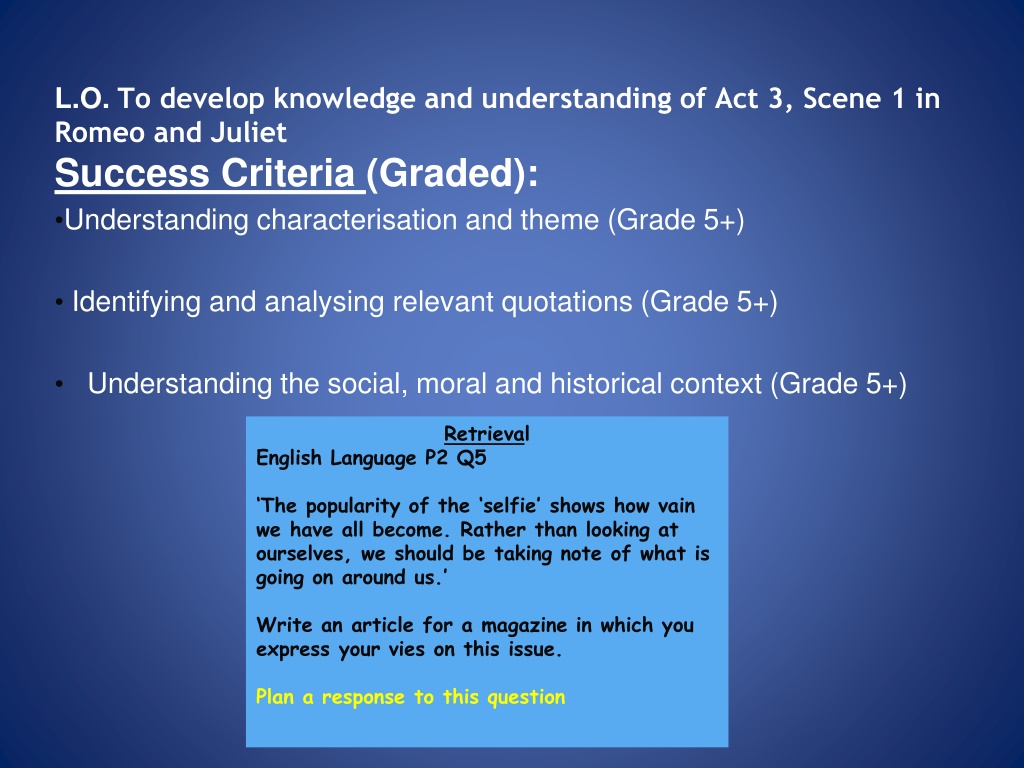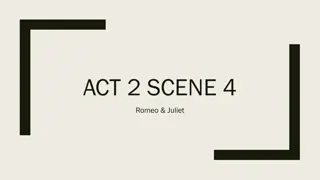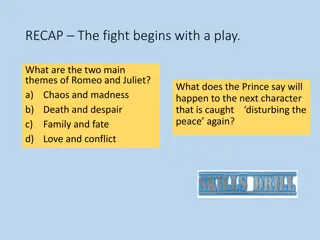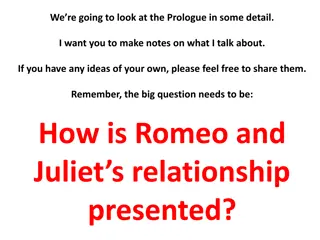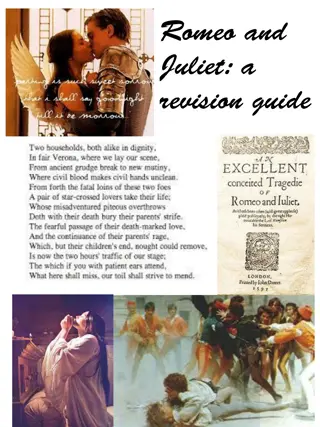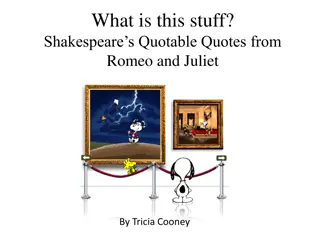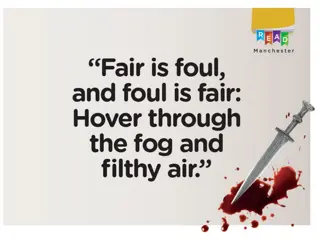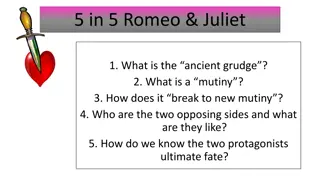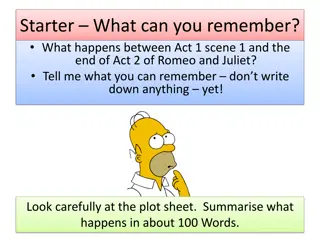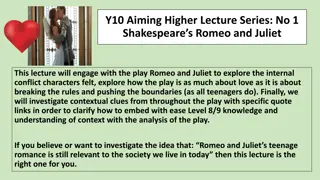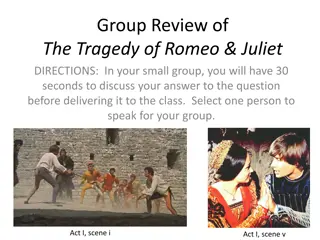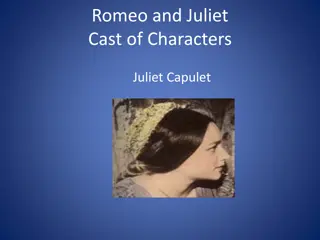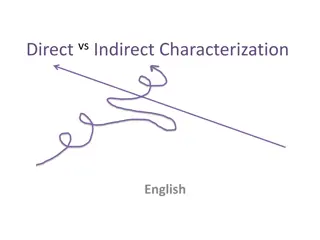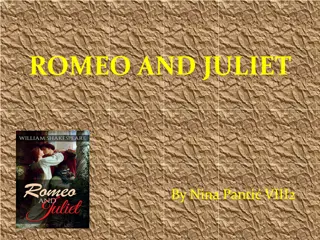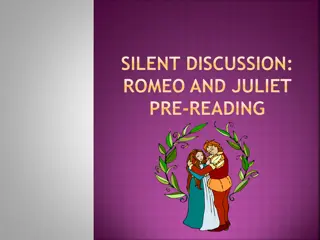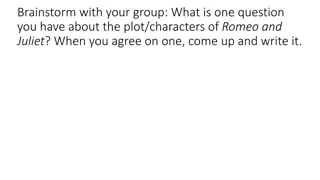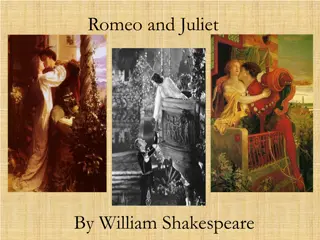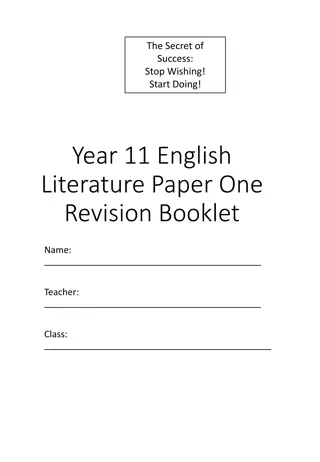Understanding Act 3, Scene 1 in Romeo and Juliet: Themes and Characterization Analysis
Explore the pivotal Act 3, Scene 1 of Romeo and Juliet, delving into character motivations, themes of violence, love, and honor. Analyze key quotations, context, and the impact of the Elizabethan era on character actions and societal norms.
Download Presentation

Please find below an Image/Link to download the presentation.
The content on the website is provided AS IS for your information and personal use only. It may not be sold, licensed, or shared on other websites without obtaining consent from the author. Download presentation by click this link. If you encounter any issues during the download, it is possible that the publisher has removed the file from their server.
E N D
Presentation Transcript
L.O. To develop knowledge and understanding of Act 3, Scene 1 in Romeo and Juliet Success Criteria (Graded): Understanding characterisation and theme (Grade 5+) Identifying and analysing relevant quotations (Grade 5+) Understanding the social, moral and historical context (Grade 5+) Retrieval English Language P2 Q5 The popularity of the selfie shows how vain we have all become. Rather than looking at ourselves, we should be taking note of what is going on around us. Write an article for a magazine in which you express your vies on this issue. Plan a response to this question
LO: To develop knowledge and understanding of Act 3, Scene 1 in Romeo and Juliet Read the following extract and answer the questions that follow on the next slide ROMEO Draw, Benvolio; beat down their weapons. Gentlemen, for shame, forbear this outrage! Tybalt, Mercutio, the prince expressly hath Forbidden bandying in Verona streets: Hold, Tybalt! good Mercutio! MERCUTIO I am hurt. A plague o' both your houses! I am sped. Is he gone, and hath nothing? BENVOLIO What, art thou hurt? MERCUTIO Ay, ay, a scratch, a scratch; marry, 'tis enough. Where is my page? Go, villain, fetch a surgeon. ROMEO Courage, man; the hurt cannot be much. MERCUTIO No, 'tis not so deep as a well, nor so wide as a church-door; but 'tis enough,'twill serve: ask for me to-morrow, and you shall find me a grave man. I am peppered, I warrant, for this world. A plague o' both your houses! 'Zounds, a dog, a rat, a mouse, a cat, to scratch a man to death! a braggart, a rogue, a villain, that fights by the book of arithmetic! Why the devil came you between us? I was hurt under your arm. ROMEO I thought all for the best. MERCUTIO Help me into some house, Benvolio, Or I shall faint. A plague o' both your houses! They have made worms' meat of me: I have it, And soundly too: your houses! Exeunt MERCUTIO and BENVOLIO ROMEO This gentleman, the prince's near ally, My very friend, hath got his mortal hurt In my behalf; my reputation stain'd With Tybalt's slander,--Tybalt, that an hour Hath been my kinsman! O sweet Juliet, Thy beauty hath made me effeminate And in my temper soften'd valour's steel!
LO: To develop knowledge and understanding of Act 3, Scene 1 in Romeo and Juliet 1.What is happening in this extract? 2.Why is scratch such a strange word to describe what has happened to Mercutio? 3. What is the ambiguity of ask for me tomorrow, and you shall find me a grave man ? 4. What is the difference between who Mercutio blames and who Romeo blames in this scene? 5. Romeo says that love has made him effeminate and softened his masculine steel what are the connotations of the two words? 6. How can we relate Romeo s reaction in this scene to the context of the Elizabethan era? How does this scene demonstrate the theme of violence? Write your response in the PEEE format.
L.O. To develop knowledge and understanding of Act 3, Scene 5 in Romeo and Juliet Success Criteria (Graded): Understanding characterisation and theme (Grade 5+) Identifying and analysing relevant quotations (Grade 5+) Understanding the social, moral and historical context (Grade 5+) Retrieval A Christmas Carol Aside from financial wealth,how are characters shown to be rich in the novella? Use evidence from the text to support your answer
LO: To develop knowledge and understanding of Act 3, Scene 5 in Romeo and Juliet Read the following extract and answer the questions that follow on the next slide LADY CAPULET: Ay, sir; but she will none, she gives you thanks. I would the fool were married to her grave! CAPULET: Soft! take me with you, take me with you, wife. How! will she none? doth she not give us thanks? Is she not proud? doth she not count her blest, Unworthy as she is, that we have wrought So worthy a gentleman to be her bridegroom? JULIET Not proud, you have; but thankful, that you have: Proud can I never be of what I hate; But thankful even for hate, that is meant love. CAPULET How now, how now, chop-logic! What is this? 'Proud,' and 'I thank you,' and 'I thank you not;' And yet 'not proud,' mistress minion, you, Thank me no thankings, nor, proud me no prouds, But fettle your fine joints 'gainst Thursday next, To go with Paris to Saint Peter's Church, Or I will drag thee on a hurdle thither. Out, you green-sickness carrion! out, you baggage! You tallow-face! LADY CAPULET Fie, fie! what, are you mad? JULIET Good father, I beseech you on my knees, Hear me with patience but to speak a word. CAPULET Hang thee, young baggage! disobedient wretch! I tell thee what: get thee to church o' Thursday, Or never after look me in the face: Speak not, reply not, do not answer me; My fingers itch. Wife, we scarce thought us blest That God had lent us but this only child; But now I see this one is one too much, And that we have a curse in having her: Out on her, hilding!
LO: To develop knowledge and understanding of Act 3, Scene 5 in Romeo and Juliet 1. What is happening in this extract? 2. Underline all of Capulet s insults that he uses towards Juliet. How would an audience react? Consider both Shakespearean and modern audiences. 3. I would the fool were married to her grave! What is Lady Capulet s reaction? Why do you think this is? 4. What does the phrase, My fingers itch suggest? 5. How does this scene link to a patriarchal society? 6. How does Capulet s reaction here contrast with his attitude towards Juliet at the beginning of Act 1, Scene 2? How does this scene portray the theme of patriarchy? Write your response in the PEEE format
L.O. To develop knowledge and understanding of Act 4, Scene 1 in Romeo and Juliet Success Criteria (Graded): Understanding characterisation and theme (Grade 5+) Identifying and analysing relevant quotations (Grade 5+) Understanding the social, moral and historical context (Grade 5+) Retrieval practise English Language P2 Q5 Charity shops have no place on our high street. Write an article for a local newspaper in which you argue for or against this point of view. Plan a response to this question
LO: To develop knowledge and understanding of Act 4, Scene 1 in Romeo and Juliet Read the following extract and answer the questions that follow on the next slide JULIET Tell me not, friar, that thou hear'st of this, Unless thou tell me how I may prevent it: If, in thy wisdom, thou canst give no help, Do thou but call my resolution wise, And with this knife I'll help it presently. God join'd my heart and Romeo's, thou our hands; And ere this hand, by thee to Romeo seal'd, Shall be the label to another deed, Or my true heart with treacherous revolt Turn to another, this shall slay them both: Therefore, out of thy long-experienced time, Give me some present counsel, or, behold, 'Twixt my extremes and me this bloody knife Shall play the umpire, arbitrating that Which the commission of thy years and art Could to no issue of true honour bring. Be not so long to speak; I long to die, If what thou speak'st speak not of remedy. FRIAR LAWRENCE Hold, daughter: I do spy a kind of hope, Which craves as desperate an execution. As that is desperate which we would prevent. If, rather than to marry County Paris, Thou hast the strength of will to slay thyself, Then is it likely thou wilt undertake A thing like death to chide away this shame, That copest with death himself to scape from it: And, if thou darest, I'll give thee remedy. JULIET O, bid me leap, rather than marry Paris, From off the battlements of yonder tower; Or walk in thievish ways; or bid me lurk Where serpents are; chain me with roaring bears; Or shut me nightly in a charnel-house, O'er-cover'd quite with dead men's rattling bones, With reeky shanks and yellow chapless skulls; Or bid me go into a new-made grave And hide me with a dead man in his shroud; Things that, to hear them told, have made me tremble; And I will do it without fear or doubt, To live an unstain'd wife to my sweet love.
LO: To develop knowledge and understanding of Act 4, Scene 1 in Romeo and Juliet 1. What is happening in this extract? 2. Be not so long to speak; I long to die If what thou speak'st speak not of remedy. What are the repetitions in these lines? What is the effects of these? 3. What is Juliet s attitude to the Friar? Why do you think that is? 4. What is the Friar s reaction? Why do you think this is? 5. Highlight all the things that Juliet says she would rather do. What does this show about her character? 6. I do spy a kind of hope Why is this quote ironic? Why is this scene important? What is the Friar s plan? Write your response in the PEEE format
L.O. To develop knowledge and understanding of Act 4, Scene 5 in Romeo and Juliet Success Criteria (Graded): Understanding characterisation and theme (Grade 5+) Identifying and analysing relevant quotations (Grade 5+) Understanding the social, moral and historical context (Grade 5+) Retrieval Inspector Calls Do you think Mrs Birling learns anything from the Inspectors visit?
LO: To develop knowledge and understanding of Act 4, Scene 5 in Romeo and Juliet Read the following extract and answer the questions that follow on the next slide LADY CAPULET What noise is here? Nurse O lamentable day! LADY CAPULET What is the matter? Nurse Look, look! O heavy day! LADY CAPULET O me, O me! My child, my only life, Revive, look up, or I will die with thee! Help, help! Call help. Enter CAPULET CAPULET For shame, bring Juliet forth; her lord is come. Nurse She's dead, deceased, she's dead; alack the day! LADY CAPULET Alack the day, she's dead, she's dead, she's dead! CAPULET Ha! let me see her: out, alas! she's cold: Her blood is settled, and her joints are stiff; Life and these lips have long been separated: Death lies on her like an untimely frost Upon the sweetest flower of all the field. Nurse O lamentable day! LADY CAPULET O woeful time! CAPULET Death, that hath ta'en her hence to make me wail, Ties up my tongue, and will not let me speak.
LO: To develop knowledge and understanding of Act 4, Scene 5 in Romeo and Juliet 1. What is happening in this extract? 2. What words would you use to describe the mourners in this scene? Why? 3. Highlight any lines where death is personified. Why is this? 4. What do you think of Lady Capulet s reaction? What was one of the last things she said to Juliet before this scene? 5. My child, my only life Where in the play have we seen Capulet use a similar line? 6. Who do you think is the most genuine in this scene? Why? How does this scene set the scene for the final action in the play? Respond in the PEEE format.
L.O. To develop knowledge and understanding of Act 5, Scene 1 in Romeo and Juliet Success Criteria (Graded): Understanding characterisation and theme (Grade 5+) Identifying and analysing relevant quotations (Grade 5+) Understanding the social, moral and historical context (Grade 5+) Retrieval Romeo and Juliet How does Shakespeare use language and poetic structures to make the balcony scene romantic?
LO: To develop knowledge and understanding of Act 5, Scene 1 in Romeo and Juliet Read the following extract and answer the questions that follow on the next slide News from Verona!--How now, Balthasar! Dost thou not bring me letters from the friar? How doth my lady? Is my father well? How fares my Juliet? that I ask again; For nothing can be ill, if she be well. BALTHASAR Then she is well, and nothing can be ill: Her body sleeps in Capel's monument, And her immortal part with angels lives. I saw her laid low in her kindred's vault, And presently took post to tell it you: O, pardon me for bringing these ill news, Since you did leave it for my office, sir. ROMEO Is it even so? then I defy you, stars! Thou know'st my lodging: get me ink and paper, And hire post-horses; I will hence to-night. BALTHASAR I do beseech you, sir, have patience: Your looks are pale and wild, and do import Some misadventure. ROMEO Tush, thou art deceived: Leave me, and do the thing I bid thee do. Hast thou no letters to me from the friar? BALTHASAR No, my good lord. ROMEO No matter: get thee gone, And hire those horses; I'll be with thee straight. Exit BALTHASAR Well, Juliet, I will lie with thee to-night. Let's see for means: O mischief, thou art swift To enter in the thoughts of desperate men!
LO: To develop knowledge and understanding of Act 5, Scene 1 in Romeo and Juliet 1. What is happening in this extract? 2. How is dramatic irony used to make the situation more tragic here? 3. What does Romeo s use of rhetorical questions suggest about his state of mind? 4. What does Romeo blame? 5. What is Romeo planning to do 6. How does this scene confirm our understanding of Romeo s impulsive nature? How is the Friar s plan going wrong? Write your response in the PEEE format
L.O. To develop knowledge and understanding of Act 5, Scene 3 in Romeo and Juliet Success Criteria (Graded): Understanding characterisation and theme (Grade 5+) Identifying and analysing relevant quotations (Grade 5+) Understanding the social, moral and historical context (Grade 5+) Retrieval A Christmas Carol Analyse the following quotation: Hard and sharp as flint
LO: To develop knowledge and understanding of Act 5, Scene 3 in Romeo and Juliet Read the following extract and answer the questions that follow on the next slide FRIAR LAWRENCE I hear some noise. Lady, come from that nest Of death, contagion, and unnatural sleep: A greater power than we can contradict Hath thwarted our intents. Come, come away. Thy husband in thy bosom there lies dead; And Paris too. Come, I'll dispose of thee Among a sisterhood of holy nuns: Stay not to question, for the watch is coming; Come, go, good Juliet, I dare no longer stay. JULIET Go, get thee hence, for I will not away. Exit FRIAR LAWRENCE What's here? a cup, closed in my true love's hand? Poison, I see, hath been his timeless end: O churl! drunk all, and left no friendly drop To help me after? I will kiss thy lips; Haply some poison yet doth hang on them, To make die with a restorative. Kisses him Thy lips are warm. First Watchman [Within] Lead, boy: which way? JULIET Yea, noise? then I'll be brief. O happy dagger! Snatching ROMEO's dagger This is thy sheath; Stabs herself there rust, and let me die.
LO: To develop knowledge and understanding of Act 5, Scene 1 in Romeo and Juliet 1. What is happening in this extract? 2. What does the Friar say that Juliet should do? 3. How does Shakespeare use language techniques to convey Juliet s confusion? 4. How is juxtaposition used in the quotation, O happy dagger! What is Juliet saying here? 5. How does this scene add to the tension that has already been built with Romeo s final moments? 6. How does this scene encapsulate the genre of tragedy? Explain with a particular focus on language in Juliet s dialogue. How is this scene important? Explain your ideas in the PEEE format.
